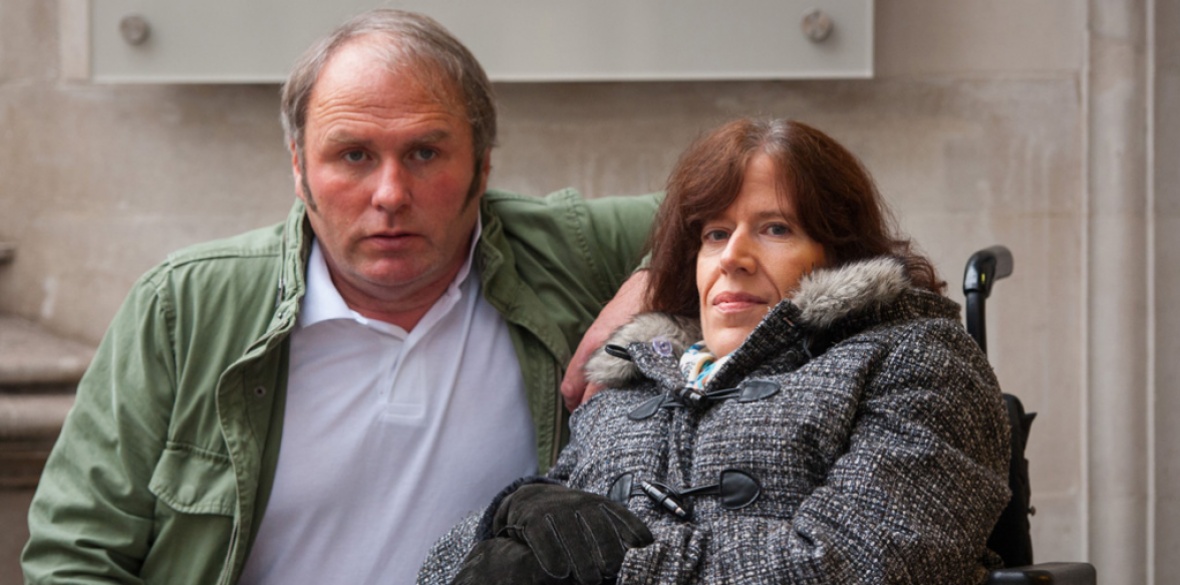This is the last article you can read this month
You can read more article this month
You can read more articles this month
Sorry your limit is up for this month
Reset on:
Please help support the Morning Star by subscribing here
WHEN Jayson and Charlotte Carmichael received the unanimous Supreme Court ruling that the bedroom tax, in their case, contravened their human rights, they thought this was an end to their mammoth four-year battle.
It was a fight the Carmichaels felt they had to undertake, as the two bedrooms they have are both in use.
Charlotte’s disability and the equipment she requires for sleeping means it’s impossible for Jayson to share a bedroom with her.
The bedroom tax is a direct charge against her disability. There is no “spare room” but the blunt tool that is the bedroom tax disregards their individual needs and as a result the Supreme Court found it was contravening their human rights.
However, the vindictive Department for Work and Pensions (DWP) is now taking a ruling in the Carmichaels’ favour from the First Tier Tribunal in 2014 to the Court of Appeal on February 20 and 21, arguing that the tribunal shouldn’t have used the Human Rights Act in its judgement.
This tribunal in 2014 said: “There was no objective and reasonable justification for such discrimination in dealing with such a seriously disabled person regarding their housing benefit.
“Accordingly the appealed decision is set aside and Section 4 (1) Human Rights Legislation 13 (b) (5) so as to avoid discrimination in the matter of housing benefit to this discrete group of disabled persons.”
The local council obeyed the ruling and the Carmichaels were not charged the bedroom tax.
This is what the DWP argument is about: bizarrely Jayson and Charlotte are being taken to court because the council obeyed the ruling of the First Tier Tribunal, which used the Human Rights Act in its ruling.
It feels like the bloody nose the DWP received as a result of the Supreme Court rulings has meant it is now trawling through the Carmichaels’ case, desperately searching for something it can try to use against them.
Is this really the best use of the court’s time and public money when Jayson and Charlotte’s case is so clear-cut?
It will make it five years that they have been fighting the government, which adds an enormous amount of stress on to a couple who are already dealing with a progressive disability with all the cost and additional pressure this entails.
However, this doesn’t mean the Carmichaels are ready to give up and roll over, as they firmly believe that their fight against this discriminatory tax is not just for them, but for the many others who find themselves in a similar situation.
Jayson says: “We’re stressed by the fact they are still continuing to use the bedroom tax to take us to court, despite the historic win in the Supreme Court when we made legal history.
“We have an excellent legal team, but it still is disappointing that the government and their top lawyers have been able to take us to court on something that no longer has much to do with our personal circumstances.
“It’s as if we are trapped in a legal technicality. The outcome means so much for others, that’s the one thing that keeps us going. The Human Rights Act is there and people should be able to access it whenever it is applicable — something this government is now trying to stop.”
Of course, ideally the bedroom tax would be abolished — something Labour has already pledged to do when elected. This is because the bedroom tax is discriminatory at its core.
What has also become clear from Jayson and Charlotte Carmichael, and that of the Rutherford family as well as other high-profile cases, is that this tax hits those with the most serious disabilities particularly hard, despite what the government might try to claim.
Theresa May’s recent reshuffle has put Esther McVey in charge of the DWP. She was a minister in the DWP with Iain Duncan Smith from 2013 to 2015, implementing some of the cruellest and most draconian “reforms,” including the bedroom tax.
By putting her in charge of the DWP it sends a message that there is more pain ahead for the increasingly large section of the population hit by the changes made to welfare benefits.
It makes it imperative for those wanting a fair society for all to take the lead from campaigners like Jayson and Charlotte, and do all we can to fight against these attacks on disabled people.
Ruth F Hunt is author of The Single Feather (Pilrig Press).








